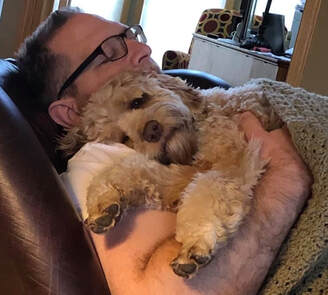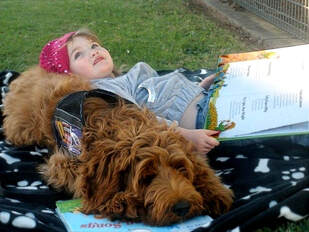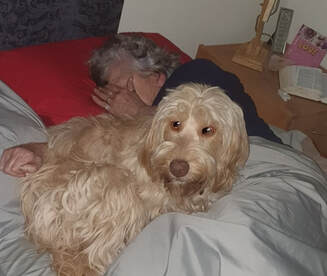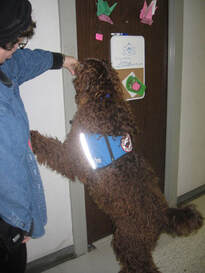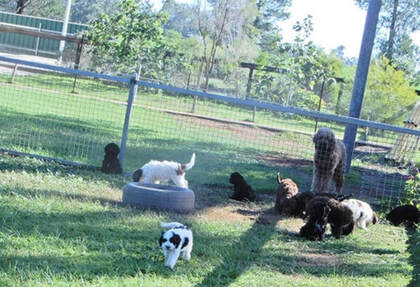|
It matters a great deal, because if you ask your breeder for the wrong one, you could end up falling in love with a dog who is totally unsuited for the purpose you got him or her for in the first place. All Australian Cobberdogs are highly intuitive to human emotion and have a great sense of fun, are goofy clowns who love to make us laugh, and who are always ready for play or activity, for they are naturally athletic and exuberant. But here we are focusing on the subtle differences between the unique traits that are inborn and which make them best suited to one destiny or the other.
|
|
Australian Cobberdogs have become extremely popular across the world and this has attracted a lot of brand new breeders, some of whom have never bred dogs before of any breed. Your breeder may or may not understand the difference between Therapy and Service Assistance dog temperament so it's important for you to be clear when you describe what you need in your own particular situation. Therapy temperament is the most often asked for, but in many litters there will be a couple of puppies better suited to Service careers than they are to family homes especially where owners are inexperienced with dogs or have very young children. Many of the problems posted on social media, are due to square pegs being forced into round holes.
|
|
Another name fot Therapy Dog could well be 'Comfort Dog' for these caring souls yearn to snuggle close to you and soothe your anxiety with their doggie empathy and loving presence. When you're feeling down, or unwell, they won't leave your side. If you're visiting hospice or homes for the elderly, they intuitively know which person in the room needs them the most and will make a bee line for that individual to stay near to them in benevolent silence and with an undeniable sensitivity to what that person is experiencing, whether it's physical or emotional pain.
R.E.A.D. Dogs or in Australia Story Dogs have Therapy Dog Temperament, as do School Dogs, and Australian Cobberdogs who work in Doctor's surgeries, Court Houses or a range of Phsychology Clinics across Australia and the world.
|
|
Therapy Australian Cobberdogs are wired for the job. It's in their genes and things like eye contact don't need to be taught. The only training they need is the basic obedience training that every puppy of any breed needs in order to be a well mannered member of the community. Certified Therapy Dogs working outside of the home are not permitted to lick, and natural lickers can be difficult to dissuade. Breeders should pass over the effusively kissing puppy in a litter when selecting a puppy they know will be doing certified Therapy work later on. So mention your intentions early on.
|
Therapy Australian Cobberdogs. How to pick one from the litter.
|
Most Australian Cobberdogs are innately - born Therapy dogs for a multitude of personal and family situations and require nothing beyond the usual basic training that any puppy needs to be a sociably acceptable member of the community. This should be no surprise, because, after all, this is the precise reason that I developed the breed in the first place!
But there is something you should know before purchasing that adorable Australian Cobberdog puppy. |
Therapy Dogs must not be lickers!
|
In fact, licking will most likely prevent your Therapy Dog puppy from passing Accreditation as a Therapy Dog.
Licking is a deeply ingrained genetic trait in some dogs and is virtually impossible to eradicate without using cruel tactics that will crush the dog's spirit and personality. Some dogs are just born lickers. So if you want your dog to be an accredited Therapy Dog, make sure you ask your breeder to select a non-licking puppy for you! |
|
To Recap on THERAPY COBBERDOGS
For Family dog, kids' dog, housebound illness, comfort in sad times, anxiety, depression, selective mutism in children, a range of confidence issues, emotional support, then THERAPY temperament is the way to go. |
ASSISTANCE DOGS sometimes referred to as SERVICE DOG or 'working temperament' |
|
ASSISTANCE DOGS NEED A JOB TO DO.
They have the same intuitive and loving nature as the Therapy Cobberdogs but-and it's a very important 'but', their temperament is underpinned with a strong prey drive. This means an intense desire or even a need to be always actively learning something new as youngsters. As puppies they are often 'mouthy' because it is in their nature to learn to do so many things that require them to use their mouths, such as 'Fetch me my Black shoes'! As an adult they need to be actively doing something that they've been taught, on a daily basis They are wired to serve. It makes complete sense when we consider some of the tasks they will be required to perform. TASKS AN ASSISTANCE COBBERDOG MIGHT HAVE TO LEARN:
Learn several hundred words & relate them to objects: i.e.
|
BRACING DOG
|
Another task a Service dog may be asked to do, is to be a Bracing Dog. This requires the dog to be large and strong, and he/she should never be asked to brace until completely mature. The larger the dog, the longer it takes to mature and this could be as late as two years of age.
When someone has balance issues, has trouble standing up out of a sitting position, or is worried about falling, their Assistance Dog wears a special harness with a handle on the top. The owner grasps the handle and leans on the dog to get up or to give confidence when walking. Caution Many people push down on a puppy's back end when teaching it to sit. This is NOT GOOD! But it's an especially bad thing to do with a puppy who is to be a bracing dog. It's important to teach a puppy to resist against any pressure on its back or rump when it is to be a bracing dog later on.
|
|
Therapy temperament cobberdog placed where Assistance/Service Cobberdog was required may result in this!
|
|
Because Cobberdogs all have receptive minds to training and puppies often pick up what's wanted after being shown just one time, this puppy's unsuitability for what's expected probably won't be recognized until thousands of dollars have been spent on training. As advanced training progresses, he will lack the enthusiasm to go further. He'll simply flunk the course because he's satisfied with what he's already learned. Because he's clever, he might even have worked out his own ways to avoid some of the tasks he's not interested in pursuing. This could lead to you thinking he's dumb but it's actually the opposite!
|
|
When an Assistance/Service Cobberdog temperament is placed where Therapy Cobberdog temperament was required it might very well look like this!
|
|
This puppy is so bored that he does anything and everything to get attention. In his mind even negative attention is better than what he perceives to be not enough! So he chews, destroys things, digs holes, and misbehaves so badly that his family are frustrated to the point of giving him up. But they love him! When he's cute he's very cute, but when he's in trouble it's breaking their hearts with indecision.
From the puppy's perspective, he always seems to be in trouble and he can't work out why. He's not to know for instance that when he's being mouthy, he's a very bad puppy only because he's in the wrong home. A mouthy Assistance/Service Dog puppy is highly prized because he's so easy to train to pick up things, manage things like velcro fasteners and learn other specialized tasks that need him to use his teeth or mouth. |
Service dog Cobberdog. How to pick a likely candidate from a litter of puppies |
|
Food, reveals a lot about a puppy’s character because it comes under the same instinct of survival as I explain in my book. Put a bowl of their favorite food or treats in amongst the hungry puppies then sit back and imagine the same scenario only with a group of very young children presented with their favorite candy. Imagine the kids don’t know they are being observed, while you notice how they react to one another with the bowl of goodies being suddenly put in front of them. The more active kids, and the bullies (strong prey drive) will end up with the most sweets.
|
Qualities of an Australian Cobberdog Assistance or Service Dog
|
Ask yourself the question: “What character traits should I be looking for in order for the dog to carry out the tasks which will be required?” True Service dogs need the following in order to excel-
|
|
These working environments require the dogs to engage with total strangers in the same way the family therapy dog engages with much loved family members it knows and trusts.
|
Therapy Australian Cobberdogs How to Choose
|
|
Be aware that trust can be broken by rough handling. Young children should not be left unsupervised to play with baby puppies.
|
|
Finally, this article wouldn't be complete without slaying the myth that smaller Cobberdogs are too active to be good Therapy dogs. A surprising number of people are telling me that even their 'hi-profile' breeder has told them this. It definitely should NOT be so. As breeders, we produce what we selectively breed for. To ignore temperament in any size of Australian Cobberdog is to eventually lose it altogether in the breed.
|

